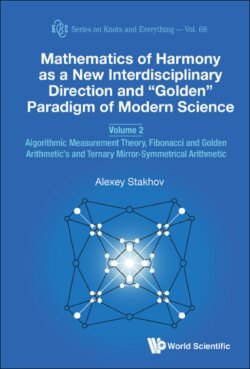Читать книгу Mathematics of Harmony as a New Interdisciplinary Direction and “Golden” Paradigm of Modern Science - Alexey Stakhov - Страница 11
На сайте Литреса книга снята с продажи.
Chapter 1 Foundations of the Constructive (Algorithmic) Measurement Theory 1.1. The Evolution of the Concept of “Measurement” in Mathematics
ОглавлениеWhat is a “measurement”? In the Great Soviet Encyclopedia, we find the following definition of this concept:
“Measurement is the operation, by means of which the ratio of one (measurable) magnitude to another homogeneous magnitude (taken as the unit of measurement) is determined; the number, determined with such ratio, is called the numerical value of the measured magnitude”.
Measurement is an important way of the quantitative cognition of the objective world. The Great Russian scientist, Dmitry Mendeleev, the creator of the Periodic Table of Chemical Elements, expressed his opinion about the measurement as follows:
“Science begins from the “measurement”. Exact science is unthinkable without measure”.
The problem of measurement plays the same significant role in mathematics as in other areas of science, in particular, engineering, physics, and other “exact” sciences.
Let’s now trace the evolution of the concept of “measurement” in mathematics [16]. As is known, the first “measurement theory” was the set of rules, which had been used by the ancient Egyptian surveyors. From this set of rules, as the ancient Greeks testify, geometry was obligated with its appearance (and name) to the problem of the “Earth’s measurement”.
However, already in Ancient Greece, the measurement problems had been divided into applied tasks related to logistics and fundamental problems related to geometry; the ancient mathematics focussed on the latter. The science of measurement was developing during this period primarily as a mathematical theory.
The discovery of incommensurable segments, made in the scientific school of Pythagoras, was one of the main mathematical achievements of this period. This discovery caused the first crisis in the foundations of mathematics and led to the introduction of irrational numbers — the second (after natural numbers) fundamental concept of mathematics. This discovery led to the formulation of the Eudoxus method of exhaustion and measurement axioms (see Section 1.2.), to which theory of numbers, integral, and differential calculus go back in their origins.
